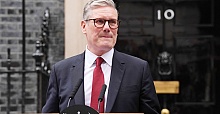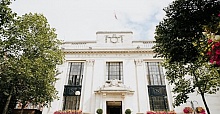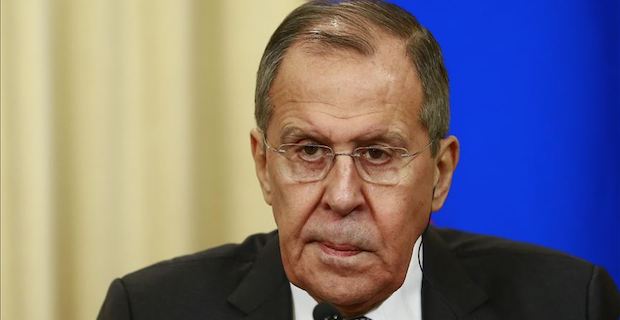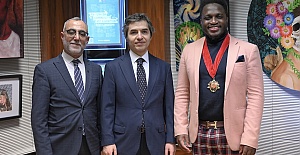Russia considers a ceasefire in Libya a basic condition for the start of a political dialogue, Foreign Minister Sergey Lavrov said Monday. Speaking at a news conference in Moscow, Lavrov said no conditions must precede the cessation of hostilities.
"I believe that a ceasefire is the main condition for starting a political dialogue. Moreover, such a ceasefire must occur without any prior requirements. It is in the interests of the Libyan people to end the fighting, declare an indefinite ceasefire and start a dialogue aimed at working out such agreements that will be implemented," he said.
He said agreements that "were offered from outside,” including at conferences in France, Italy and the United Arab Emirates, did not work.
"Now there is a lot of talk about preparations for a conference in Berlin. All this will maintain the current unclear situation if the parties do not agree very specifically on how to ensure that all political, clan and ethnic interests in Libya are taken into account.”
As for declaring a no-fly zone over Libya, this idea has a negative connotation, as the bombardment of the country started after the UN Security Council authorized such a regime, he added.
“It is better to make sure that all international players, without exception, influence the Libyan sides in one direction -- to immediately stop fighting, declare an indefinite ceasefire and negotiate among themselves, and to agree so that then all this is carried out. And of course, the role of the UN Security Council in securing such final international agreements is absolutely essential here."
On Nov. 27, Ankara and Libya's UN-recognized Government of National Accord (GNA) signed two separate pacts: one on military cooperation and the other on maritime boundaries of countries in the Eastern Mediterranean.
Libya has remained beset by turmoil since 2011 when a bloody NATO-backed uprising led to the ouster and death of long-serving President Muammar Gaddafi after more than four decades in power.
Since then, Libya’s stark political divisions have yielded two rival seats of power -- one in Tobruk and another in Tripoli -- and a host of heavily armed militia groups.


 Prime Minister Keir Starmer's 2025 Easter message
Prime Minister Keir Starmer's 2025 Easter message After Nesil Caliskan a by-election will be held in Jubilee ward in Enfield
After Nesil Caliskan a by-election will be held in Jubilee ward in Enfield Publishing the analysis, Labour’s Cllr Ergin Erbil said Everybody in Enfield deserves basic rights
Publishing the analysis, Labour’s Cllr Ergin Erbil said Everybody in Enfield deserves basic rights Gaza-Israel conflict Statement from Cllr Ergin Erbil, Leader of Enfield Council
Gaza-Israel conflict Statement from Cllr Ergin Erbil, Leader of Enfield Council The European Union called on Turkey to uphold democratic values
The European Union called on Turkey to uphold democratic values Turkish citizens in London said Rights, Law, Justice
Turkish citizens in London said Rights, Law, Justice The Council of Turkish Cypriot Associations Geneva response letter
The Council of Turkish Cypriot Associations Geneva response letter Sustainable Development and ESG, Will This Become the Course for Turkic World
Sustainable Development and ESG, Will This Become the Course for Turkic World The 'Prince of Paris' has impressed in his first EuroLeague season
The 'Prince of Paris' has impressed in his first EuroLeague season Saran Media And Euroleague Basketball Extend Media Rights Partnership for Four More Years
Saran Media And Euroleague Basketball Extend Media Rights Partnership for Four More Years Will Rangers be Jose Mourinho’s next victim?
Will Rangers be Jose Mourinho’s next victim? Jose Mourinho's Fenerbahce face Rangers on Thursday
Jose Mourinho's Fenerbahce face Rangers on Thursday Barclays has become the biggest UK lender so far to cut mortgage rates
Barclays has become the biggest UK lender so far to cut mortgage rates THE SPRING STATEMENT EXPLAINED, UK ECONOMIC OUTLOOK AND GROWTH FORECASTS
THE SPRING STATEMENT EXPLAINED, UK ECONOMIC OUTLOOK AND GROWTH FORECASTS Launch of Made in Enfield gift shop to celebrate local artists and designers
Launch of Made in Enfield gift shop to celebrate local artists and designers Trial used smart Wi-Fi sensors for live building occupancy data to optimise
Trial used smart Wi-Fi sensors for live building occupancy data to optimise
















